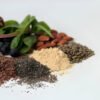Many women with PCOS have insulin resistance syndrome. This is a complex metabolic disorder with it’s own cluster of symptoms.
Patients with insulin resistance have problems with their glucose metabolism. Normally, after eating a meal, the resulting glucose-from-food is dispersed by the pancreatic hormone insulin to the cells for use as energy. But in patients with insulin resistance, the cells become insensitive to insulin, and are therefore unable to ‘accept’ their usual amount. As a result, the pancreas either becomes exhausted trying to produce extra insulin, (leading to diabetes) or else the body suffers from excessively high levels of insulin (leading to obesity, and increased risk of heart disease).
Causes of Insulin Resistance
The main known causes of insulin resistance syndrome are a combination of genetic factors, obesity (about 50-60 percent of women with PCOS are obese), and insufficient physical exercise.
Treatment of Insulin Resistance
The most effective way to improve insulin resistance in overweight and obese people, is through a combination of weight loss and increased physical activity. Research indicates that using a low GI (glycemic index) diet helps to reduce insulin insensitivity and improve glucose metabolism. Weight loss typically lowers blood pressure and increases cell sensitivity to insulin. Exercise is an important in weight reduction and improves a number of heart-health indicators. Medications to improve insulin sensitivity are also available, although most doctors prefer to start with diet and exercise and turn to drugs if needed.
Insulin Resistance and PCOS
It’s important to note that insulin resistance, hyperinsulinemia, and insulin insensitivity is not common to all patients with polycystic ovary syndrome. Furthermore, insulin disorders may be symptoms of more underlying causes. Even so, experts consider that normalizing insulin response may reduce PCOS symptoms like obesity or severe overweight, erratic periods, excessive body and facial hair, and acne, as well as improving the risk of heart disease and diabetes in the process.
For an excellent diet plan for PCOS, see Low-GI Diet





